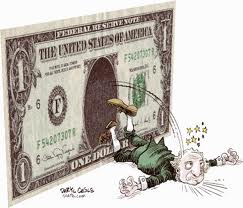Close window | View original article
Everyone's Right About America's Downgrade
On both sides, no less.
We at Scragged usually enjoy the privilege of writing about what we want to write about - something interesting, something compelling, hopefully a view at least somewhat unique.
Then there are those events which require an article even if we can't find anything particularly unique to say. Standard & Poor's downgrade of America's debt, for the first time since World War I, is one of those, in large part because everything conceivable to be said is being said by someone.
Therein lies something strange. In reading countless opinions of others, as is our customary habit, we have come to a bizarre realization: the opinions from both sides are all more or less right! Even - especially - the contradictory ones.
Yes, this historic downgrade is a giant slap in the face - if not a punch to an even more sensitive spot - of President Obama and his administration. Yes, it will make no difference whatsoever to his re-election chances.
Yes, it makes American government look feckless and incompetent. Yes, it also won't make a long-term in the markets, because the American government has not merely looked feckless and incompetent but been feckless and incompetent for the entire careers of most financial decision-makers. Nothing new save perception, which was none too good last week either.

Even the frothing hyper-partisans make valid points despite themselves, to wit New York Times hack and ex-Enron adviser Paul Krugman:
S.& P. itself has even lower credibility; it’s the last place anyone should turn for judgments about our nation’s prospects...
America’s large budget deficit is, after all, primarily the result of the economic slump that followed the 2008 financial crisis. And S.& P., along with its sister rating agencies, played a major role in causing that crisis, by giving AAA ratings to mortgage-backed assets that have since turned into toxic waste.
Nor did the bad judgment stop there. Notoriously, S.& P. gave Lehman Brothers, whose collapse triggered a global panic, an A rating right up to the month of its demise.
He's spot on: S&P's authority to judge who's sound and who's broke is, shall we say, questionable. Of course, though Krugman doesn't point it out, it's also worth noting that S&P's errors are all in one direction: namely, claiming that bust firms were as sound as a dollar. Now, they're claiming that the dollar might not be all that sound itself; reality is most likely much worse even than S&P will admit, but it's not materially worse than it was last week before this ludicrously overdue downgrade.
It's even correct to claim, as did Sen. Kerry, that this is the "tea-party downgrade" - though not, of course, for the reasons he proffers. It is not the Tea Party's fault that America can't pay its debts, most of which predate the Tea Party by many years; it can, however, be credited to the Tea Party that America has finally realized the problem, with the awkward but irrelevant side effect that S&P finally noticed several years after everyone else did.
How can everyone be right all at once? Because, in a world where high finance is almost totally disconnected from actually making and selling real products, underlying physical reality and what gets displayed on your Bloomberg terminal are completely different things. Sooner or later, reality always catches up with you, but not all at once or in a predictable and organized way.
Not just America, but Europe as well, has been dead broke for years now. S&P finally woke up and took a hesitating step towards the junk bond rating that's properly our due. So what? Nothing's changed; there's nothing to see that we didn't already know.
Actually, what we need is not less fervent argument, but more, and more widespread:
By rights, it should be Europe that is immersed in this debate, but its leaders are so steeped in the sacred texts of social democracy that they cannot admit the force of the contradictions which they are now hopelessly trying to evade... Collapsing before our eyes is the lodestone of the Christian Socialist doctrine that has underpinned the EU’s political philosophy: the idea that a capitalist economy can support an ever-expanding socialist welfare state.
It cannot, and our current market and financial upheavals simply reflect that everyone is at long last beginning to realize just how badly we've undermined the foundations of the world's wealth.
We're explained how economies are entirely dependent on faith. So are fiat currencies - heck, even hard currencies are faith-based unless you personally have taken inventory of Ft. Knox. So is government at all levels; so is society.
In fact, so is civilization itself. We walk around every day on the general assumption that we won't run into a ravaging army around the next corner. This has been true since the end of the Indian Wars, but as Chicago shoppers and Milwaukee fairgoers discovered to their stunned surprise, it isn't true anymore.
Your money or your life? How about, your money and your life? Is that why gun sales took off after Mr.Obama was elected?